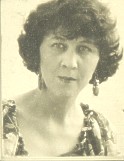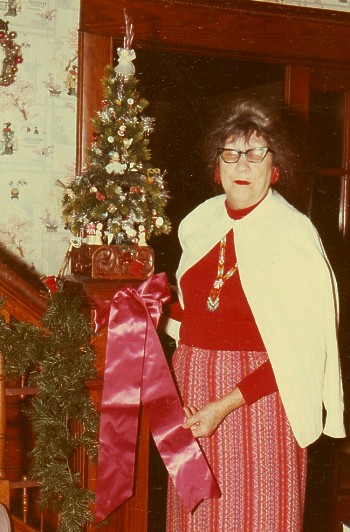Velma Carson
Velma Lenore Carson, the daughter of Edward Lincoln Carson and Viola Belle (Pettey) Carson, was born April 30, 1896, on a farm a few
miles southwest of Morganville, Kansas. Both of her parents had briefly taught school. Carson also taught in a one-room school
for a year before attending what would become Kansas State University (KSU) in nearby Manhattan. The United States' involvement in
World War I occurred during her college years and Carson helped entertain the soldiers at nearby Camp Funston, a training base on
the grounds of Fort Riley. She majored in journalism and was involved in plays, literary societies, and oratory. She was editor of
the school yearbook and was class president for a year.
Strong-willed by nature, it is hard to say with certainty if it was by accident or design that Carson did not take
a then-required course called Kitchen Gardening. Perhaps she felt a farmer’s daughter already knew all she needed to know
in that area. So despite having more credits than required for graduation, she left without her degree. She worked first for a
newspaper in Kansas City and then moved to Chicago, where she worked for various publications, many agriculture-related.
In 1922, she married Homer Cross, an electrical engineer and former class president at KSU. They moved to
Pennsylvania, where Cross had a job with Westinghouse Electric. Later, the couple moved to New York City, where Cross worked for
the electric railway and Carson was a writer, authoring everything from advertising copy to short stories and poems. Daughter
Cynthia was born in 1928.
Carson worked with and was a supporter of Margaret Sanger, best known for promoting family planning through the use of birth
control. Carson helped distribute unionizing information to Pullman porters during her travels. Both activities were illegal at
the time and involvement could have resulted in jail time.
While initially very happy with her marriage, Carson later described it as a bad one. There is reason to believe that her strong-willed ways helped lead to the couple's 1931 divorce. After, Carson continued her journalistic career and later remarried. Second husband Leonard Rennie was a painter and architect who worked for the federal government during the Depression.
Carson around 1935.
Prior to World War II, the family moved to the Washington, D.C. area. The family of three occasionally expanded to four
as Rennie's son Crane by a previous marriage would join them. During the war, Rennie's government job kept him in
Portugal much of the time. Carson continued to work for a wide variety of literary publications.
After the war, Carson and Cynthia returned to Morganville, apparently for a visit. While they were there, Rennie wrote to inform her
he was divorcing her. It apparently came as somewhat of a surprise to Carson. She claimed that like Cross, he had a roving
eye. He, somewhat like Cross, claimed she was just too hard to live with.
In regard to Carson's altruistic efforts to help Fèves, her son-in-law once described them as possibly the high point
of her life. Shortly after, Cynthia, who had attended high school in Morganville, left for college and never returned except
for visits and to marry. Cataracts plagued Carson's eyesight. Her worldliness and liberal leanings in conservative Kansas
made it hard for her to be accepted by neighbors. The folksy rural type of written materials she created were no longer much
in demand.
Cynthia attended Kansas State Teachers College - now Emporia State University - in Emporia, Kansas. She graduated in 1950 with
an emphasis in the same areas her mother had pursued at KSU. Cynthia taught for a year in Hoxie, Kansas, before moving on to
New York to look for a life similar to the one her mother had led. While working on her master's degree, Cynthia met the man
who was to become her husband. She and Gould Colman made a life together in Ithaca, New York, he as the archivist at Cornell
University, and she as a teacher.
Carson was known for making her holiday home decorations as elaborate as the pageant play and this continued for many years.
She saw these efforts as making the celebration what it should be, but some saw it as getting in the way of enjoying their
time together.
Carson in her decorated Morganville home.
With increasing age and infirmity, Carson moved to Ithaca to live with her daughter and son-in-law. She eventually
received her degree from Kansas State University. Her situation came to the attention of then-Arts-and-Sciences dean William
Stamey. Noting that Kitchen Gardening was no longer a requirement, Carson had enough other credits to graduate. While ill health
prevented her attending, she was awarded her diploma at the spring commencement in 1982.
Carson died on August 8, 1984, in Ithaca, New York. Her ashes were scattered on the grounds of the schoolyard where she had
taught. The land had been part of the Pettey family farm.
On Tuesday, August 27, 65 years to the day after the pageant, Freeland and Vaughan were making preparations to visit
Cynthia and husband Gould in Ithaca, New York. Unfortunately, by their arrival the following Sunday, Cynthia had
fallen ill and so they did not meet.
But Gould was a good host and shared many stories. During a short tour of the home, he showed a side room with
a full-size filing cabinet. At least three drawers were filled with Carson's journalistic endeavors.
Everything they heard about Carson convinced them she was an unusual person. But when they saw the bright-red vertical-striped
wallpaper in what had been Carson's room, they couldn't help but think of candy canes and were convinced their impressions of
Carson were correct.
Cynthia died a few days later. Judging by the comments her students made after her death, she had possessed many of her mother's
best traits.



